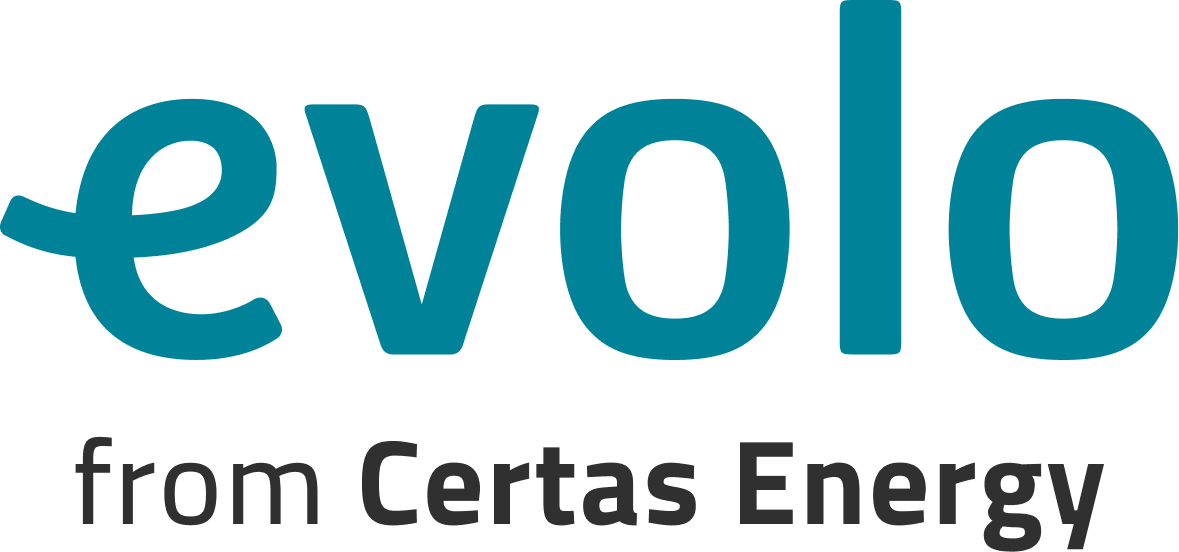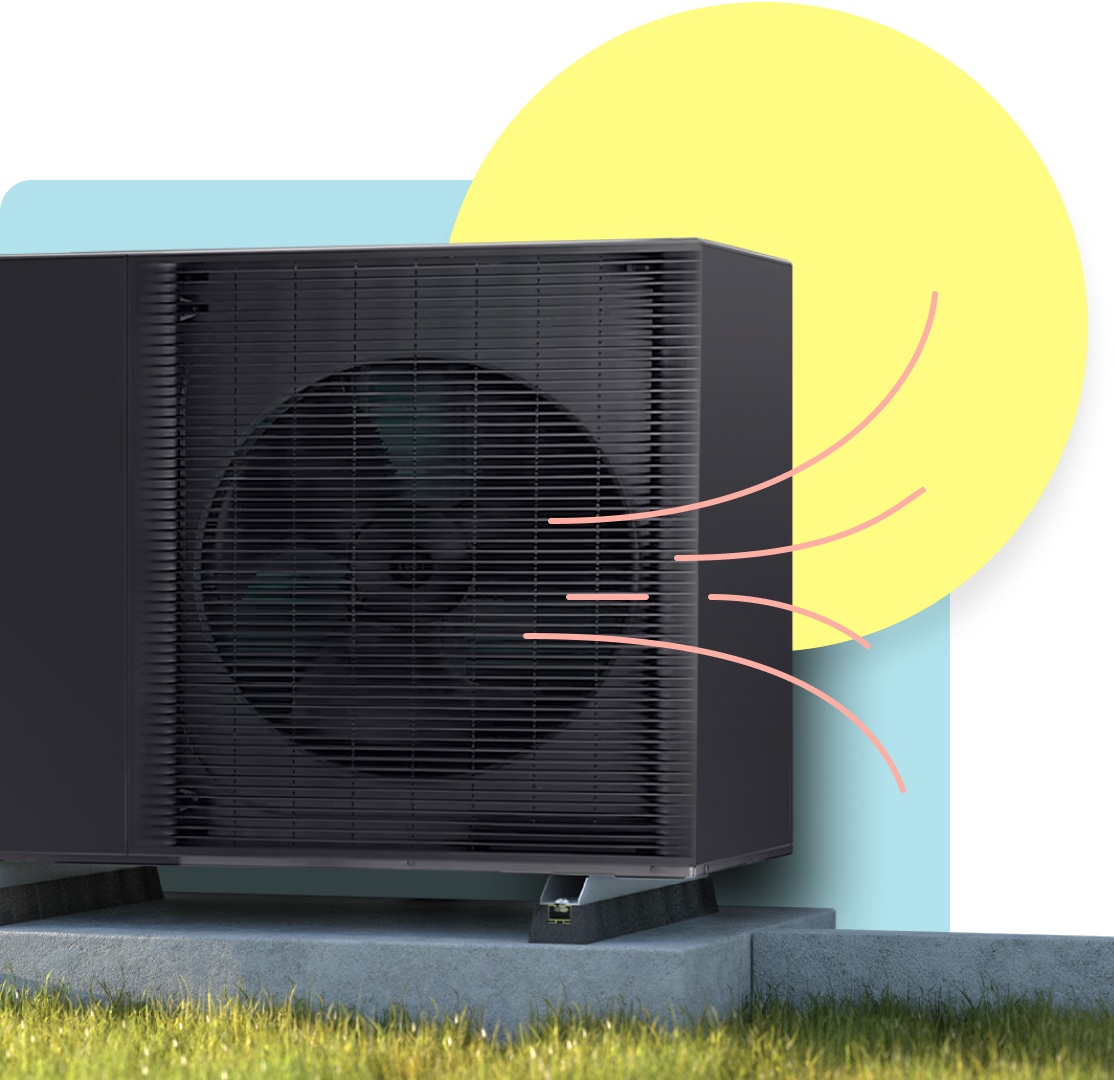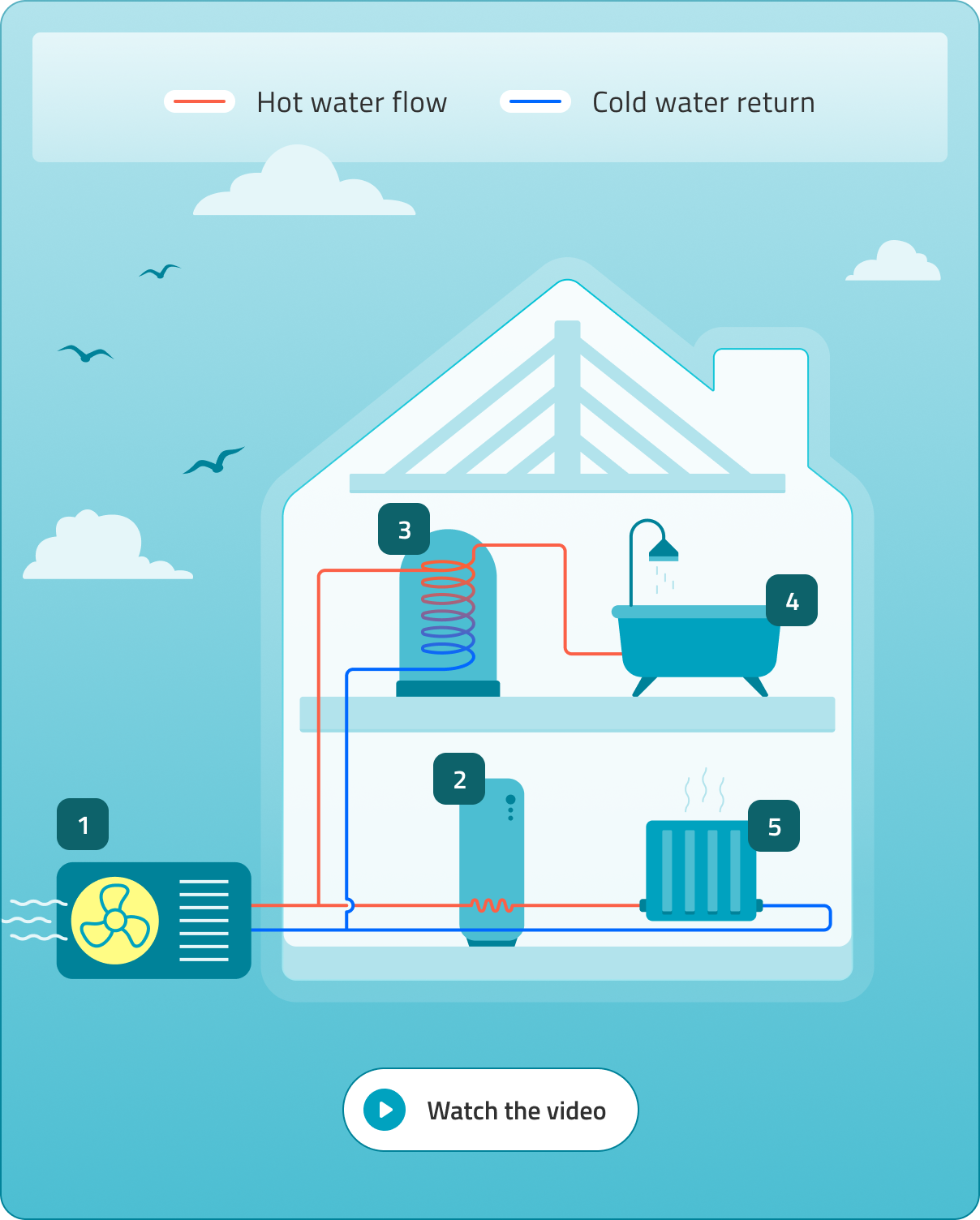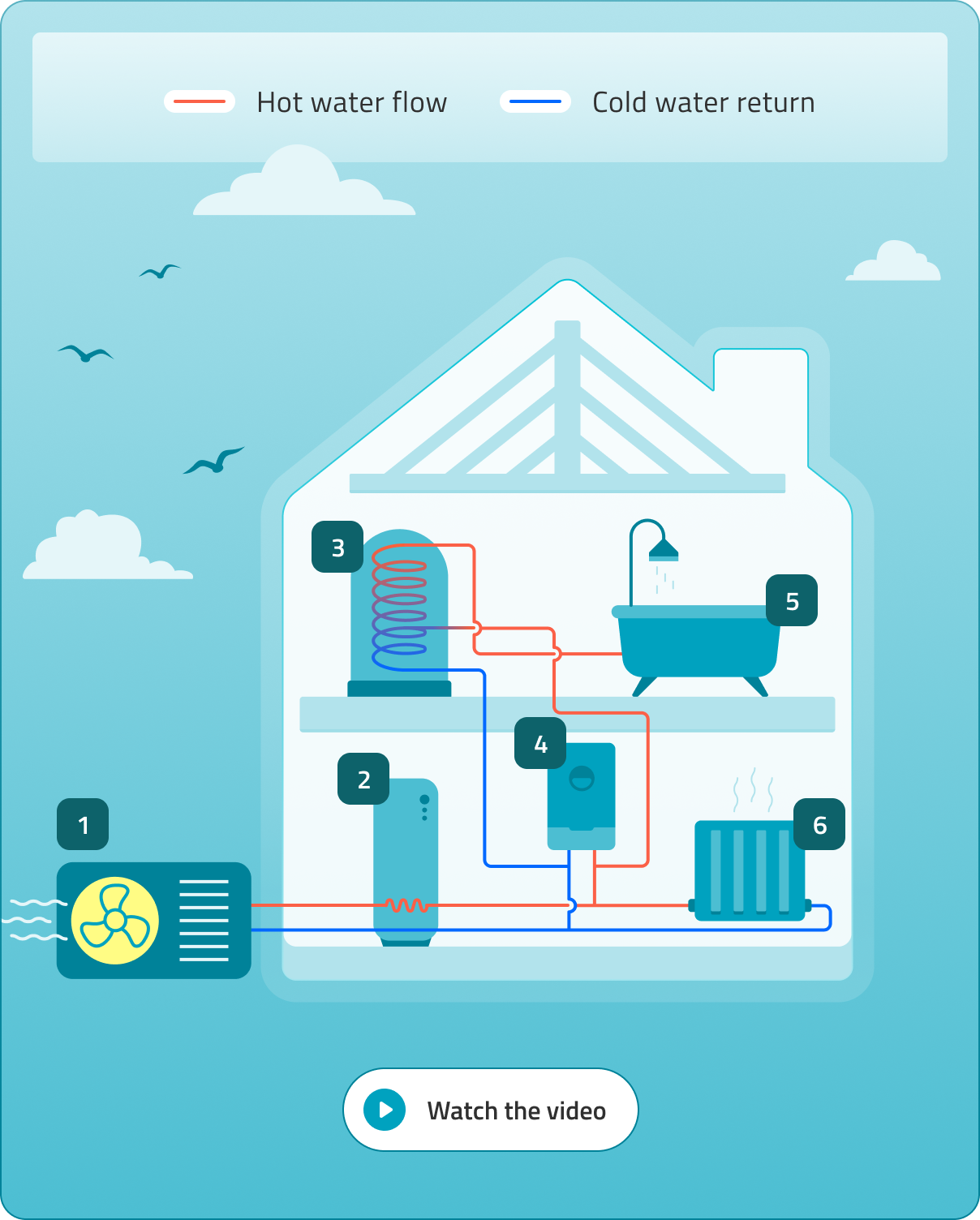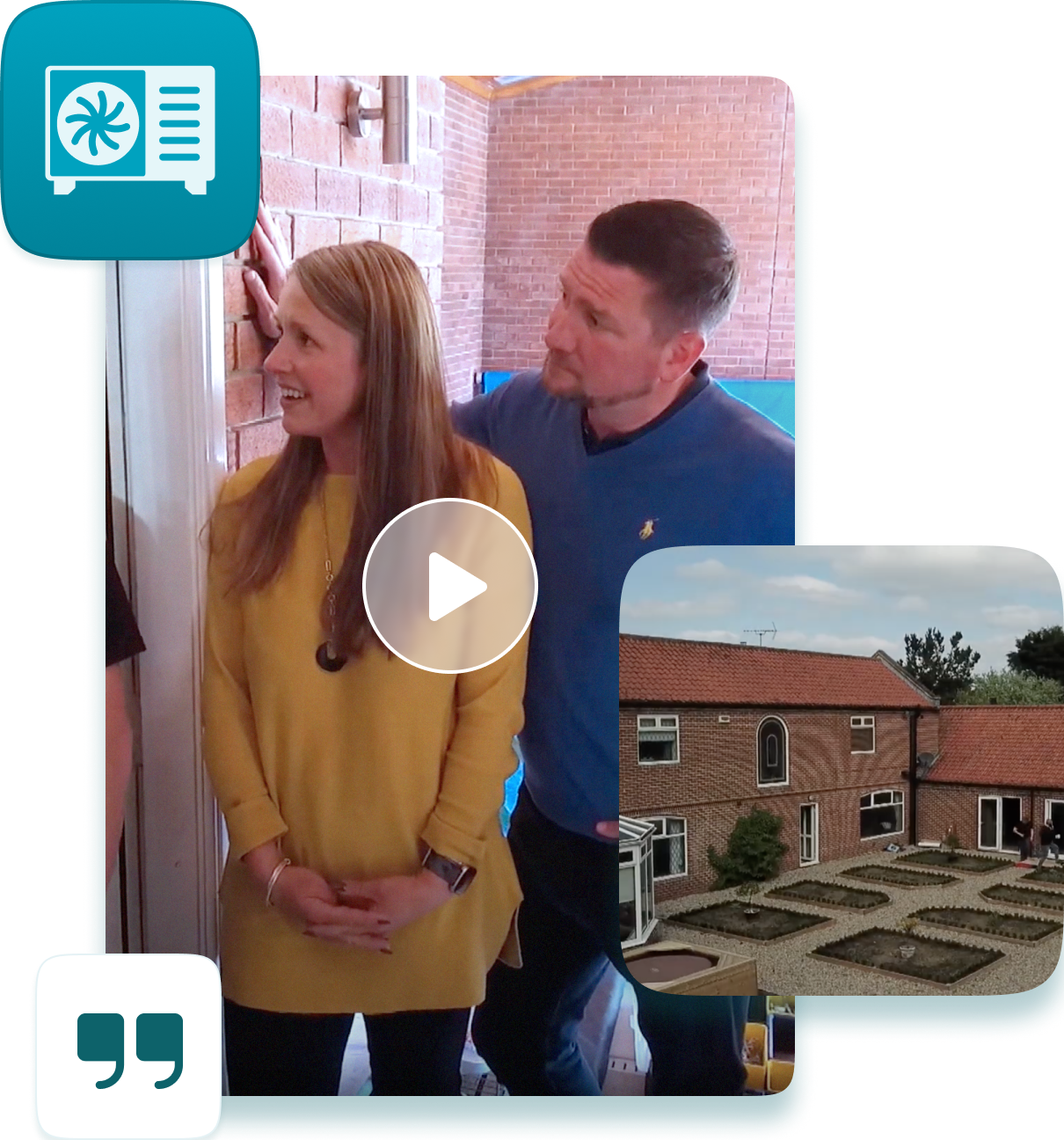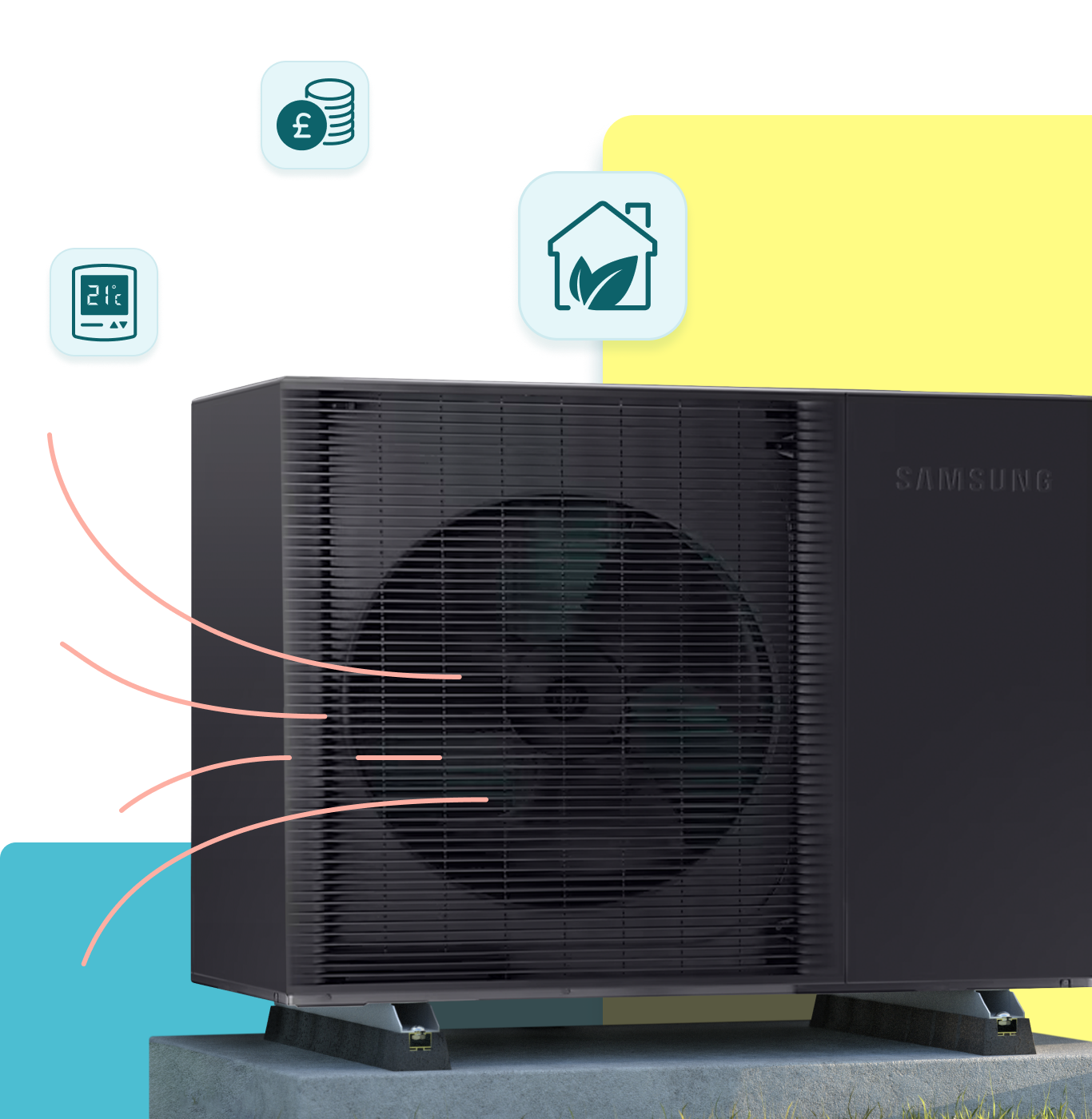
THE EVOLUTION OF HOME HEATING
Boost your energy efficiency with an air source heat pump
Let Evolo from Certas Energy support you every step of the way to a lower carbon future through air source heat pump install and maintenance services.
WHAT ARE AIR SOURCE HEAT PUMPS?
Another way to heat your home
Air source heat pumps extract heat from the outside air and transfer it to circulate water to heat radiators, underfloor heating, or a hot water cylinder. Creating sustainable and cost-effective space and water heating whilst reducing your carbon emissions.
A new way to heat your home
With up to 4 times greater efficiency than a gas or oil boiler and suitable for many homes with radiators or underfloor heating, heat pumps provide ample hot water and heating for a busy family home.
Affordable installation
Dependant on your home and current energy efficiency rating upgrading to an air source heat pump can be supported by the Governments Boiler Upgrade Scheme, a £7500 grant to support homeowners to transition to low carbon technology to heat their home.
Wake up and arrive to a warm home
Heat pumps provide consistent warmth throughout the day without hassle. Paired with smart controls you can effortlessly adjust your heating so that it is always right for you.
Reduce carbon footprint by upto 65%
Transitioning to a low carbon air source heat pump for heating your home can significantly reduce its carbon footprint, roughly by 2 tonne of CO2e annually - equivalent to removing a car from the road for a year.
A better way to heat your home
Elevate the comfort of your home and reduce your impact on the environment by making the switch to an air source heat pump. Our specialist advisors are available to provide help and guidance on how to introduce an air source heat pump into your home and answer any questions that you may have.
Upgrade to a heat pump with Evolo
Whether your old boiler no longer provides the warmth and water pressure that you’d like, you could transform your heating system by working with Evolo. We'll conduct a survey, recommend the best-fit kit and connect you with a trusted local installer. Enjoy a warm home with minimal disruptions.
HOW DOES IT WORK?
What type of Heat Pump is right for your home?
- Dedicated heat pump
- Hybrid heat pump
Dedicated heat pumps
Utilising advanced technology, a dedicated heat pump absorbs heat from the outside air and transfers it into the building via a refrigerant and compressor system, providing efficient and cost-effective heating.
A dedicated heat pump works best in these types of homes
- Cottages
- Semi-detached
- Detached, well insulated
-
1
Air source heat pump
This is the beating heart of your home, it draws air in from the outside and uses it to heat your home and water.
-
2
Buffer tank
An insulated tank that adds additional volume of hot water to your heating system.
-
3
Water storage
The water is heated and stored ready for use immediately when you need it.
-
4
Instant hot water
You'll get instant hot water at any time of the day.
-
5
Consistant central heating
Staying at a comfortable constant temperature all day long is a much more efficient way of heating your home.
Hybrid heat pumps
A hybrid heat pump is a system that uses a heat pump alongside another heat source, this could be an existing or newly installed oil or gas boiler.
A hybrid heat pump works best in these types of homes
- Large detached
- Detached, poorly insulated
-
1
Air source heat pump
This is the beating heart of your home, it draws air in from the outside and uses it to heat your home and water.
-
2
Buffer tank
An insulated tank that add additional volume of hot water to your heating system.
-
3
Water storage
The water is heated and stored ready for use immediately when you need it.
-
4
Traditional boiler
In larger houses or where the insulation isn’t greatly efficient, pairing a heat pump with a traditional boiler can boost your system.
-
5
Instant hot water
You'll get instant hot water at any time of the day.
-
6
Consistent central heating
Staying at a comfortable constant temperature all day long is a much more efficient way of heating your home.
“Evolo installed an air source heat pump in our home and it has been fantastic! Not only are our heating bills significantly lower, but the system is also very quiet and efficient. The team at Evolo were professional, and knowledgeable and made the installation process very easy.”
ADAM & SALLIE, York
END-TO-END SERVICE
We make the process easy from start to finish
-
1
Speak to an advisor
Consult with an advisor to discuss your needs and find the right solution for your needs.
-
2
Unbiased evaluation
We’ll evaluate your property and make recommendations tailored to you. Many homes will benefit from the installation of an air-source heat pump but if not, we will always point you in the right direction.
-
3
Expert installation
We work with only trusted, expert installers who ensure a high-quality of install and a tidy home when they are finished.
-
4
Enjoy your new system
Enjoy a warmer home and lower energy bills on average with your new system, fully integrated into your home.
-
5
Peace of mind in excellent after care
Our team will make sure your system is running optimally with experts available for support should you need it.
Our advisors will start off with a full assessment of your property and offer the best available solution. If your home isn’t viable for a air source heat pump we can offer alternative home improvements.
We’re installing Air Source Heat Pumps in North Wales
Due to unprecedented demand we are currently only installing in the CH, CW, SY and LL postcodes:
LEARN MORE
Frequently asked questions
-
A heat pump heats your home and provides hot water. The heat pump installation replaces your boiler and can be connected to the central heating system. By extracting heat from the air, the installation produces renewable energy. So, you can enjoy sustainable heating. Electricity is required to make an air source heat pump work, so your use of electricity increases. However, oil or gas consumption decreases considerably or even drops to zero depending on the type of solution you install, reducing CO2 emissions for heating the home. View our explainer video here.
-
With an all-electric heat pump, you no longer need to use oil or gas for heating your home, and with a hybrid heat pump, you reduce oil or gas consumption by up to 80%. An air-source heat pump can be the first step on your journey to making your home more sustainable.
-
The air source heat pump uses energy from the air and electricity to heat a home. Heating a home with oil or gas causes the greenhouse gas CO₂ to enter the atmosphere, contributing to global warming. With an air source heat pump, the house is (for a large part) heated with renewable energy, and you use less or no oil or gas, thus reducing your CO₂ emissions.
-
A heat pump indoor unit takes up a little more space than a traditional central heating boiler. If you opt for an all-electric variant, you must install a water cylinder with the heat pump for hot tap water (for showering, baths etc.). Moreover, with an outside air source heat pump, there is always an outside part that takes up around 1 m².
-
The better your house is insulated, the better the result. Without good insulation and low-temperature heating, an all-electric heat pump is inefficient. You then have to buy a large heat pump, and in many cases, the installation will not work optimally. Fewer structural adjustments are required for a hybrid heat pump. But in all cases, the following applies: the better a house is insulated and the lower the temperature in your heating system required to heat your home, the higher the pump’s efficiency.
-
You can add a heat pump to an existing gas or oil central heating boiler. By adding a heat pump to a current central heating boiler, a bivalent/hybrid system is created, and you can make considerable savings on oil or gas consumption. With bivalent/hybrid systems, the user often has to determine whether the heating is carried out by the central heating system or the heat pump. It is also possible to do this based on the outside temperature.
